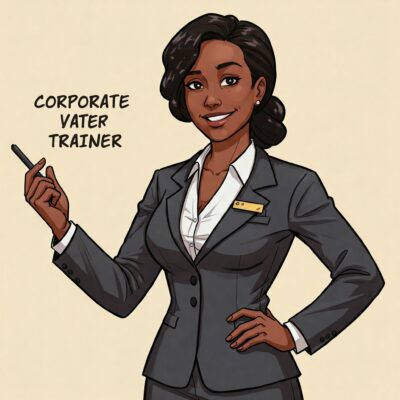Corporate trainers design and deliver training programs for employees to improve their skills, productivity, and job performance. They work in diverse industries, tailoring content to meet organizational goals.
What is a typical day in Corporate Training?
– Assessing training needs by consulting with managers and employees.
– Designing training materials, including presentations, handouts, and online modules
– Conducting in-person or virtual training sessions on topics like leadership, technical skills, or workplace safety
– Evaluating training effectiveness through feedback, assessments, and performance metrics
What else might they be expected to do?
– Stay updated on industry trends and integrate new techniques into training programs
– Develop onboarding programs for new employees
– Create leadership development programs for high-potential employees
What type of training is needed for this career path?
– A Bachelor’s degree in Education, Business, or a related field is often required.
– Certification in training and development (e.g., Certified Professional in Learning and Performance – CPLP) is an asset.
– Experience in teaching, facilitation, or a relevant industry is highly beneficial.
What kind of personality is needed to excel in this career path?
– Confident, organized, and communicative individuals thrive in this role.
– Big 5 traits: Extraversion and Conscientiousness.
– Myers-Briggs types: ENFP or ENTJ often align with this career.
What kind of interests do people in this career path have?
– Passion for teaching, leadership, and personal development (Social and Enterprising traits).
– Interest in workplace dynamics and improving organizational performance.
– Interests & Aptitude: Social (S), Enterprising (E), and Conventional (C)
Are there any innate skills or aptitudes required?
– Strong public speaking and facilitation skills to engage participants
– Creativity to design interactive and impactful training sessions
– Analytical skills to assess the effectiveness of training programs
What challenges can I expect to face if I pursue this career path?
– Keeping training content relevant and engaging for diverse audiences
– Balancing the needs of employees and organizational priorities
– Managing time and logistics for delivering multiple training sessions
What are the job prospects for this path in Kenya and Africa? What about International prospects for a Kenyan citizen?
– Kenya and Africa: Corporate trainers are in demand as companies prioritize skill development and employee engagement. Opportunities exist in large organizations, consulting firms, and NGOs.
– International: Corporate trainers are sought after globally, especially in industries like tech, finance, and healthcare. Kenyan trainers with specialized skills or certifications can access international roles.
What should I focus on if I choose to pursue this career?
– Develop strong facilitation and instructional design skills.
– Gain experience in delivering training within specific industries.
– Build expertise in leadership, communication, and change management.
Which other careers or job roles can I progress to?
– Learning and Development Manager
– HR Specialist in Training and Development
– Organizational Development Consultant
– Executive Coach
– E-Learning Specialist

